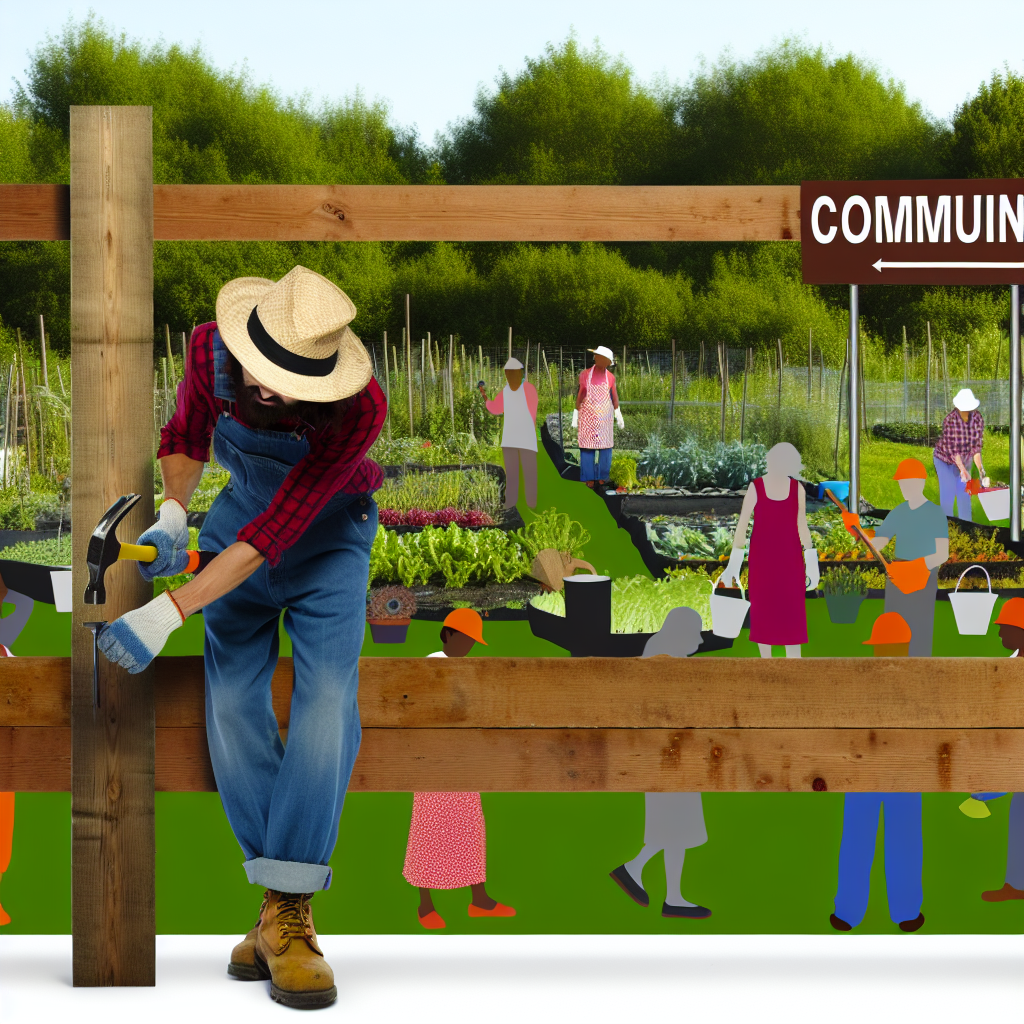Introduction to Small Farms and Their Relevance in Local Communities
Small farms significantly contribute to the vibrancy of local communities.
They provide fresh, nutritious food that promotes healthy living.
In addition, these farms foster economic growth through job creation.
Moreover, local small farms strengthen social connections among residents.
They encourage community participation in food systems.
As a result, these farms promote a sense of belonging and collaboration.
The Role of Small Farms in the Local Economy
Small farms stimulate the local economy by sourcing goods locally.
They help reduce transportation costs and carbon footprints.
Additionally, these farms often keep revenue within the community.
Local farm markets create opportunities for vendors and entrepreneurs.
Enhancing Food Security
Small farms enhance food security in their areas.
They offer diverse produce that meets local needs.
This approach reduces reliance on imported foods.
Consequently, communities become more resilient to food shortages.
Building Community Connections
Local farms encourage residents to engage with their food sources.
Transform Your Agribusiness
Unlock your farm's potential with expert advice tailored to your needs. Get actionable steps that drive real results.
Get StartedThey often host events such as harvest festivals and farm tours.
These activities strengthen bonds among community members.
Furthermore, they create educational opportunities about sustainable practices.
Supporting Sustainable Practices
Small farms often implement sustainable farming techniques.
For example, they use organic practices to grow food naturally.
This approach protects local ecosystems and promotes biodiversity.
Additionally, small farms educate consumers about the importance of sustainability.
Economic Impact of Small Farms on Local Economies
Job Creation
Small farms play a critical role in job creation.
They employ local residents and contribute to community stability.
Additionally, these jobs often support families and enhance local spending power.
Boosting Local Businesses
Small farms invigorate local economies through partnerships.
They supply fresh produce to local restaurants and markets.
Furthermore, local businesses benefit from collaborative marketing efforts.
Increasing Access to Fresh Produce
By prioritizing fresh, locally sourced food, small farms improve community health.
Access to fresh produce fuels healthier diets and reduces food deserts.
Moreover, it encourages sustainable practices within the community.
Fostering a Sense of Community
Small farms often serve as gathering spaces for residents.
They host farmer’s markets, educational workshops, and community events.
Consequently, these activities foster relationships and build social capital.
Encouraging Local Choice and Ownership
Small farms empower communities to make choices about food sources.
They provide consumers with transparency about agricultural practices.
Additionally, they offer unique products reflective of local culture.
Environmental Benefits
Small farms contribute positively to the local environment.
They promote biodiversity and efficient land use practices.
Showcase Your Farming Business
Publish your professional farming services profile on our blog for a one-time fee of $200 and reach a dedicated audience of farmers and agribusiness owners.
Publish Your ProfileMoreover, these farms utilize sustainable farming methods that benefit soil health.
How Small Farms Foster Community Engagement and Participation
Building Local Connections
Small farms create a vital connection between agriculture and local residents.
They serve as gathering places for community events and activities.
Additionally, these farms often host workshops that educate locals about sustainable practices.
Encouraging Participation
Many small farms invite community members to volunteer for hands-on experiences.
Volunteering fosters a sense of ownership and belonging among participants.
Moreover, collaborative activities promote teamwork and shared goals.
Nurturing Local Economies
Local farms contribute to the community by generating jobs and supporting local businesses.
They encourage residents to shop locally, boosting the economy.
As a result, money spent within the community circulates multiple times.
Creating Food Systems Awareness
Small farms raise awareness about food systems and where food comes from.
By engaging in conversations about food sourcing, they build knowledge and trust.
This awareness fosters healthier eating habits and lifestyle choices.
Enhancing Social Bonds
Farms often become hubs for social interaction among diverse groups.
They host farmers’ markets that attract families and friends seeking fresh produce.
These interactions strengthen community bonds and create lasting friendships.
Inspiring Community Resilience
Small farms enhance community resilience by promoting self-sufficiency.
They provide essential resources during times of crisis, such as food shortages.
This resilience is crucial for building stronger, more adaptable communities.
Find Out More: Beyond Organic: How Farm-to-Table Is Evolving with Consumer Demands
The Role of Small Farms in Promoting Sustainable Agriculture
Supporting Local Economies
Small farms contribute significantly to local economies.
They create jobs through farming and ancillary services.
Moreover, these farms keep money within the community.
As a result, local businesses benefit from farm-related purchases.
Additionally, farmers often source supplies from nearby vendors.
Encouraging Biodiversity
Small farms play a crucial role in promoting biodiversity.
They often grow a variety of crops and raise diverse livestock.
This practice enhances soil health and pest control.
Furthermore, small farms protect native habitats.
By maintaining diverse ecosystems, they contribute positively to the environment.
Implementing Sustainable Practices
Many small farms adopt sustainable agricultural practices.
They often use organic farming methods to reduce chemical use.
Crop rotation and cover cropping improve soil health.
Additionally, small farm operations typically emphasize water conservation.
These approaches mitigate environmental impacts effectively.
Fostering Community Connections
Small farms serve as community hubs.
They offer local markets where residents buy fresh produce.
These venues promote direct relationships between farmers and consumers.
Moreover, many farms host educational workshops.
Such events enhance awareness of sustainable practices.
Showcase Your Farming Business
Publish your professional farming services profile on our blog for a one-time fee of $200 and reach a dedicated audience of farmers and agribusiness owners.
Publish Your ProfileAdapting to Climate Change
Small farmers are often more resilient to climate change.
They use diverse farming techniques to adapt to changing conditions.
Innovative practices increase their efficiency in resource use.
Farmers can quickly implement sustainable responses as impacts arise.
This adaptability helps ensure food security for local communities.
See Related Content: Farm-to-Table 2.0: How Direct Farm Sales Are Redefining Local Markets
Case Studies of Successful Small Farms Strengthening Local Ties
The Green Valley Farm Initiative
The Green Valley Farm is a prime example of community engagement.
They produce organic vegetables for local restaurants and markets.
Moreover, they offer weekly CSA boxes to families in the area.
This initiative fosters a direct connection between farmers and consumers.
Additionally, they host seasonal events to promote local produce.
The events include farm tours and cook-off competitions.
Such activities enhance community spirit and awareness about sustainable practices.
Sunnyside Gardens
Sunnyside Gardens focuses on teaching sustainable gardening practices.
They run workshops for families and schools throughout the year.
As a result, participants gain hands-on experience in growing food.
These educational programs strengthen relationships within the community.
Furthermore, Sunnyside Gardens collaborates with local nonprofits.
This partnership aims to provide fresh produce to food-insecure families.
Consequently, they help nourish both the body and the community.
The Harvest Network
The Harvest Network connects small farmers to urban markets.
They coordinate distribution, making it easier for producers to reach customers.
This network increases the visibility of local farms.
In turn, this boosts local economic sustainability.
Moreover, The Harvest Network organizes community-supported agriculture fairs.
These fairs educate consumers about seasonal produce and nutrition.
Ultimately, they inspire a commitment to supporting local farmers.
Willow Creek Farm
Willow Creek Farm implements regenerative farming techniques.
They focus on soil health and biodiversity on their land.
This commitment enhances the farm’s resilience to climate change.
In addition, Willow Creek involves local schools in hands-on learning.
Students visit the farm to learn about agriculture and ecology.
This program cultivates an appreciation for local food systems.
Moreover, Willow Creek hosts seasonal harvest festivals for the community.
These events create a festive atmosphere while celebrating local produce.
Impact of Small Farms on Local Communities
These case studies showcase the vital role small farms play.
They actively nurture stronger local communities through various initiatives.
By connecting people to land and food, they foster meaningful relationships.
Ultimately, these efforts contribute to a healthier local ecosystem.
You Might Also Like: How Strengthening Your Farm-to-Table Strategy Can Boost Local Sales
Showcase Your Farming Business
Publish your professional farming services profile on our blog for a one-time fee of $200 and reach a dedicated audience of farmers and agribusiness owners.
Publish Your Profile
Challenges Faced by Small Farms in Building Community Connections
Competition with Larger Farms
Small farms often struggle against larger agricultural operations.
These larger farms benefit from economies of scale.
Consequently, small farms may struggle to attract local business.
Limited Resources
Small farms frequently operate with modest financial resources.
This limitation affects their marketing and outreach efforts.
Moreover, lack of access to technology can hinder growth.
Seasonal Fluctuations
Seasonality affects the availability of farm products.
This can limit opportunities for consistent community engagement.
During off-seasons, small farms may face income insecurity.
Regulatory Hurdles
Navigating agricultural regulations can be complex.
Small farms may lack the legal knowledge required to comply.
Additionally, such regulations can hinder adaptation to market demands.
Building Trust and Awareness
Establishing trust takes time in any community setting.
Small farms must actively participate in community events.
Yet limited participation can result in lower local visibility.
Community Support and Engagement
Small farms often rely on local support for success.
However, community engagement can be challenging.
Understanding what community members appreciate is essential.
This understanding guides effective outreach and development.
Discover More: How Farm-to-Table Is Changing Dining Forever
The Importance of Local Food Systems and Farm-to-Table Initiatives
Understanding Local Food Systems
Local food systems directly connect producers with consumers.
This connection reduces transportation time and costs.
Additionally, it enriches communities culturally and economically.
Small farms often prioritize sustainability and ethical practices.
Therefore, they tend to yield fresher, healthier food options.
Community Impact of Farm-to-Table Initiatives
Farm-to-table initiatives promote local agriculture.
These initiatives strengthen the community’s economy.
They create jobs and promote local entrepreneurship.
Moreover, they encourage people to support local farmers.
Individuals gain access to seasonal and organic produce.
Enhancing Social Connections
Buying local food fosters relationships among community members.
Farmers’ markets and local restaurants become social hubs.
This interaction promotes a sense of belonging.
Consequently, it creates a vibrant local culture.
The Environmental Benefits
Supporting local food systems significantly benefits the environment.
Locally sourced food typically requires less transportation.
This leads to reduced greenhouse gas emissions.
Additionally, small farms often use sustainable practices.
Therefore, they help maintain biodiversity and healthy ecosystems.
Future Trends: How Technology Is Helping Small Farms Build Stronger Communities
Enhancing Communication Through Technology
Small farms are leveraging technology for improved communication.
Showcase Your Farming Business
Publish your professional farming services profile on our blog for a one-time fee of $200 and reach a dedicated audience of farmers and agribusiness owners.
Publish Your ProfileSocial media platforms connect local farmers with their communities.
Farmers can share updates and engage consumers directly.
This interaction fosters a sense of community and transparency.
Utilizing Data for Better Decision Making
Farmers are using data analytics for informed decision making.
This technology helps them optimize crop yields and reduce waste.
As a result, farms become more efficient and sustainable.
Moreover, data-driven insights enhance long-term planning.
Building Online Marketplaces
Technology enables small farms to create online marketplaces.
These platforms promote local products directly to consumers.
As a result, farmers gain access to a wider audience.
Local consumers benefit from fresh produce and supporting local economies.
Implementing Sustainable Practices with Tech
Technology equips farms to adopt sustainable practices effectively.
For instance, precision agriculture tools monitor soil health closely.
Farmers can reduce inputs while maximizing production.
This balance supports environmental sustainability and community wellness.
Collaboration Through Networking
Local farms engage in technological networking for collaboration.
They participate in community-supported agriculture (CSA) programs.
This approach strengthens ties among farmers and their clients.
Networking helps farmers share resources and knowledge easily.
Additional Resources
Rooted in resilience: Community & Farming Go Hand-in-Hand, a …




